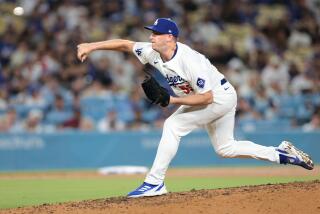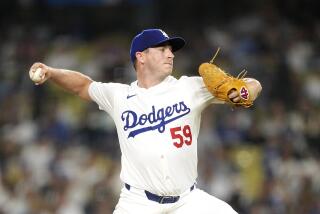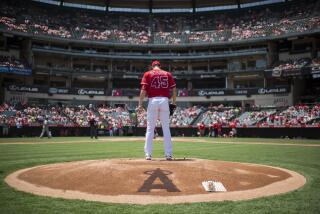Trouble for Phillips, Angels
- Share via
The often-stormy baseball career of Tony Phillips took a dramatic downturn early Sunday when the Angel leadoff batter was arrested for felony possession of cocaine in an Anaheim motel room.
According to the Anaheim Police Dept., Phillips negotiated the purchase of a small quantity of free-base cocaine shortly after midnight Saturday. Soon thereafter, police investigators entered the room and found Phillips in possession of the cocaine along with paraphernalia to ingest it.
Phillips, 38, was arrested without incident, transported to the Anaheim Police temporary detention facility and booked. He posted bail and was released several hours later, and his case will be presented to the Orange County District Attorney’s office for review.
The Anaheim Police Dept. Street Narcotics Unit, using undercover investigators and confidential informants, was conducting an investigation into the street-level sale of cocaine and learned that Phillips may have been involved in the purchase--and use--of the drug.
“There was an ongoing investigation, and during the course of it he was arrested, not as a seller, but as a buyer,” Anaheim Police Sgt. Joe Vargas said.
Vargas said Phillips did not buy from an undercover officer, but purchased the drug from someone working with the police.
Phillips returned to his Scottsdale, Ariz., home before Sunday’s 4-3 loss to the Baltimore Orioles, but Manager Terry Collins said he will be back in the lineup for Tuesday’s game against the Chicago White Sox in Chicago.
“He has our support and will have the players’ support, and we’ll move ahead until something else changes,” Collins said. “It’s a very big shock, but when you’re faced with adversity as we have been all season, everyone else has to pick up their play. We’ve done it before; we’ll do it again.”
After speaking with Phillips, Collins said he is “convinced this hasn’t been an ongoing problem.”
Phillips, who last season got into a fistfight with a heckler during a game in Milwaukee’s County Stadium and was suspended for three days by the American League for starting a brawl with the Boston Red Sox in 1995, was in the original lineup for Sunday’s game.
But when the charges were brought to the team’s attention, the Angels closed their clubhouse at about 2 p.m., three hours before the game, and Phillips, a key component on the Angels’ American League West-leading team, was scratched from the lineup.
Angel General Manager Bill Bavasi, who confirmed that Phillips was picked up for possession of an illegal substance but would not elaborate on the charge, said a joint decision among Phillips, Collins and front-office officials was made for Phillips to return home. Attempts to reach Phillips were unsuccessful.
“Tony was here, he wasn’t sent away,” Bavasi said. “But it didn’t seem to make any sense for him to try to perform without taking care of things at home.”
In a prepared release, the Angels said they “intend to comply with all Major League Baseball rules regarding the Tony Phillips situation. At the same time, we intend to let the legal process run its proper course.”
Baseball, however, has not had a formal drug policy since the Joint Drug Agreement terminated in 1985, and cases are now handled on an ad hoc basis, meaning there is no spelled-out procedure.
According to Rich Levin, Major League Baseball spokesman, a player incurring his first drug offense can fight the charge through normal legal channels or admit he has a problem and seek help.
At that point, he would be examined by doctors Robert Millman, who represents the baseball clubs, and Dr. Joel Solomon, who represents the players’ union, and they would recommend a course of action.
In most cases, the player would go on the disabled list and be enrolled in a drug program, which usually lasts 15 to 30 days. But if a player has incurred a second offense, there is a possibility of disciplinary action.
“Any number of things can be done to him and for him,” a union source said.
Bavasi, when asked if this was a first offense for Phillips, said he “could not answer that.”
Levin said Phillips “is entitled to due process and technically eligible to play,” and Bavasi said Phillips, who is batting .279 and helped spark the Angels to a 46-31 record since his May 18 trade from Chicago to Anaheim, would return Tuesday in a playing capacity.
“If he maintains his innocence and challenges any charges he can continue to play as long as the legal process goes on,” Levin said. “If he acknowledges he has a drug problem and needs help, he will be enrolled in a program.”
Neither the Angels, who are now run by the Walt Disney Co., nor Bavasi would comment further, other than to say in a statement that the organization “does not condone the use of illegal substances for any member of its ballclub.”
Disney spokesman John Dreyer said the company would evaluate the facts of the situation before taking any action.
“We don’t want to rush to judgment,” Dreyer said, “but we certainly don’t tolerate or condone or promote the use of illegal substances.”
Tony Attanasio, Phillips’ agent, would not discuss the charges in detail but seemed to suggest they were not as severe as they appear.
“It’s something that’s explainable,” Attanasio said. “I don’t know that it’s easily explainable, but it is explainable. I expect it can be resolved in a short time . . . we are martialing all the information.”
Every Angel player queried about Phillips after Sunday’s game declined comment, but Sparky Anderson, the Angel broadcaster who managed Phillips for five seasons at Detroit, was stunned by the news.
“Damn, I really feel bad about this,” Anderson said. “I’m very close to him, and he has so much good in him. What the heck could have happened?”
Phillips, a 15-year big league veteran who is considered one of the best leadoff hitters in the game, is in his second stint with the Angels, having helped them to the brink of the 1995 division title by hitting .261 with 27 homers and 61 RBIs that season.
But Phillips hit just .198 during the last two months of the ’95 season, as the Angels blew an 11-game lead and lost to Seattle in a one-game playoff to determine the AL West champion.
The Angels did not re-sign Phillips for 1996, so he signed a two-year, $3.6-million contract with the White Sox before the 1996 season. But he left spring training abruptly, announcing his retirement before returning 48 hours later.
Phillips hit .277 with a league-leading 125 walks last season and started the 1997 season with Chicago. Phillips, one of the most fiery competitors in baseball, was ejected from an April 21 game and had to be restrained by three teammates as he charged umpire John Shulock.
AL President Gene Budig suspended Phillips for two games, and Phillips accused Budig of being a racist. Several weeks later he was traded to the Angels, who welcomed his intensity, his high on-base percentage and his run-scoring capabilities.
In addition to the Milwaukee incident in 1996 and the Shulock incident last April, Phillips also sparked a bench-clearing brawl against the Dodgers July 3 when he took offense to a Chan Ho Park inside fastball, and he got into a shouting match with a fan who had thrown a peanut at him from behind the Angel dugout in Cleveland on July 30.
Staff writers Ross Newhan and David Reyes contributed to this report.
More to Read
Go beyond the scoreboard
Get the latest on L.A.'s teams in the daily Sports Report newsletter.
You may occasionally receive promotional content from the Los Angeles Times.







